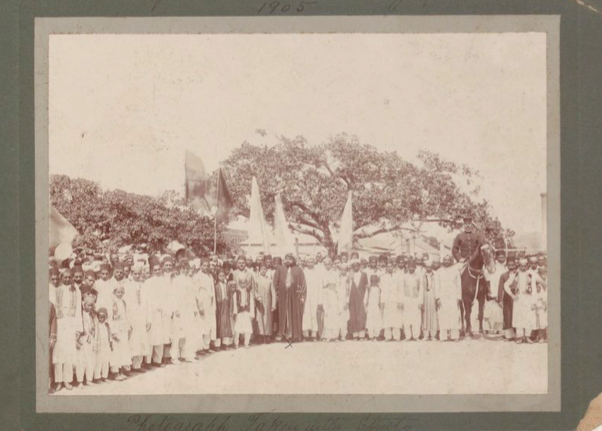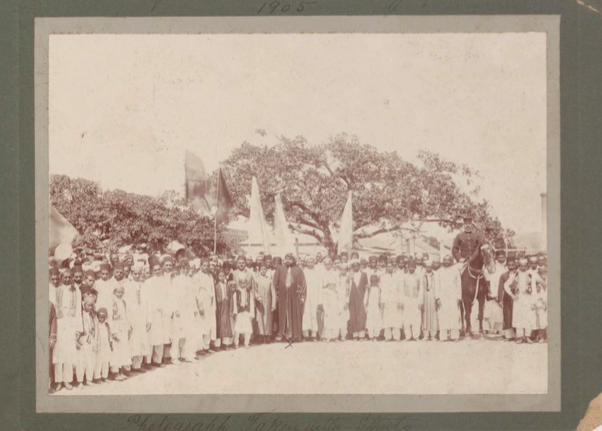The Ottoman Empire was the last great Islamic Empire. Today, many stories between the Ottoman Caliphate and local Muslim communties have been forgotten. The forgotten photos and documents from the Turkish Archives in Istanbul, however, may be able to bring back some of those memories. Indeed, numerous correspondences between Türkiye and South Africa highlight the aforementioned relations between the Ottoman Caliphate and South African Muslim Community, less than a hundred years ago. These historical materials remind us of a remarkable solidarity that existed between two communities on the opposite ends of the world.
Ottoman Legacy in South Africa
On the 16th of January 1863, Turkish Islamic scholar Abu Bakr Effendi arrived at the Cape of Good Hope. Upon his arrival, the Standard and Mail newspaper noted that Hadji Abu Baker Effendi and his nephew Omer Lutfi arrived at Table Bay on board the Norman Ship from Istanbul via Liverpool. Abu Bakr Effendi opened an Islamic school at the corner of Wale and Bree Streets and gathered more than 300 pupils in a short time. Turkish Theologians Learned Cape Afrikaans to teach Muslims.
As a multi-lingual scholar, Abu Bakr Effendi could easily master new languages. He learned English and Afrikaans to communicate with the local people. He then wrote a religious catechism, Beyanud’Din for Cape Muslims in Arabic Afrikaans. For this purpose, he needed to create new Arabic diacritics to represent Afrikaans phonemes that did not exist in Arabic. According to Historian Ahmed Davids, “Abu Bakr Effendi resolved this difficultly by creating two vocalisms to indicate the Afrikaans letters. In mitigation of Abu Bakr Effendi’s failure to write the Afrikaans spoken by the community, one must admit that writing of Bayan al-Din was a remarkable achievement. It becomes even more remarkable when it is considered that he was learning English and Cape Muslim Afrikaans while writing this book. Abu Bakr Effendi was indeed an exceptional linguist.” Effendi died in Cape Town and was buried in the Tana Baru Cemetery in 1880.
After the death of Abubakr Effendi another Ottoman theologian Mahmud Fakih Effendi translated a verse, Surah al Mulk from the Qur’an into Afrikaans using the Arabic – Afrikaans script. Professor Mahmud Fakih Effendi taught his students at his school in Castle Street and died in 71 Wale Street in 1913.
Muslim activities in Johannesburg and Durban in the colonial South Africa
The Muslim Society in South Africa established Hamidia Islamic Society in Cape Town, Johannesburg, and Durban in 1890s in the name of the Turkish Sultan Caliph Abdulhamid Khan II. In Johannesburg, Imam Abdulkader Bawazeer, in Durban Osman Ahmed Effendi, and in Cape Town, Hajje Suleiman Shah, were the respective presidents of the Hamidia Islamic Society. In February 1906, Durban Muslims congratulated the Sultan of the Ottoman Empire on the celebration of the sacrifice of the Prophet Ebrahim, Eid ud Doha. A prominent Muslim Osman Ahmed of Durban was the one who was communicating with the Ottoman Caliphate with regards to Islamic affairs in South Africa. According to cable communications subsequently passed between Osman Ahmed Effendi of Durban and the First Private Secretary to His Imperial Majesty the Sultan Abdulhamid Khan in Istanbul, the Hedjaz Railway project was about to be completed from Damascus to Medina.[i]
Sometimes British Indian Associations gathered around the Grey mosque with prominent Indian Muslims and Hindus and Chinese. Apparently in the meeting, all “non-white” South Africans congratulated Hilari Gandhi and Thambi Naidoo on their arrest and imprisonment. The secretary of Ottoman Hedjaz Railway Project, Osman Ahmed Effendi, also congratulated Mahatma Gandhi on his son’s imprisonment. The struggle for racist colonial policy united Chinese, Indian, and Ottomans in Colonial South Africa.[ii]In September 1908, Indian Opinion reported that Osman Ahmed Effendi of Durban and Haji Suleiman Shah of Cape Town and Imam Abdul Bawazeer of Johannesburg celebrated the opening of the Ottoman Hejaz Railway. Muslims from Durban to Stellenbosch, closed their shops to attend the celebration in honor of the Sultan’s accession.[iii]
Many similar news about supporting Ottoman Caliphate or receiving support from the Ottoman Sultan were published in Turkish and South African newspapers in 1900s. Ottoman Archives bring another dimension to the topic, which is evidence of the mutual relationship between Türkiye and Muslim community in Durban. According to a Turkish archival document, the Muslim society sent their best wishes to the Sultan of Türkiye in the mount of Ramadan but also took a photo of the Durban Muslims and sent it to Istanbul for Ottoman Caliph Sultan Abdul Hamid II. These photos and documents prove the sincere relations between the Turkish Sultan and Indian Muslim community in Durban and the remarkable historical events, which have been left forgotten in the dusty pages of Ottoman Archives.[iv]
Conclusion
Indeed, Ottoman scholars such as Abu Bakr Effendi in South Africa, Emin Effendi in Zanzibar, and Sinan Effendi in Egypt were teaching local Muslims in African countries while the western colonialists were exploiting inhabitants in the continent. Therefore, while colonists were trying to exploit Africa from Cape to Cairo, Ottoman Turks were establishing mosques and schools from Egypt to South Africa. One must ask why Jomo Kenyatta stated that: “When the missionaries first came to Africa, they had the Bible, and we had the land. They said, ‘Let us pray’. We closed our eyes. When we opened them, we had the Bible, and they had the land” is an answer for the main question of Africa at the present.

(See, Ottoman Archives, Istanbul, HE. SFR. 3. 00730. 00057. 001)

Notes
[i] Indian Opinion, 17 February 1906, “Durban Muhammedans” p. 4. Durban
[ii] Indian Opinion, 1 August 1908 “More Meetings” Durban South Africa
[iii] Indian Opinion, 12 September 1908, Celebration at the Cape” p. 11. Durban.
[iv] Ottoman Archives, HE. SFR. 3. 00730. 00057. 001.
















Leave a Reply